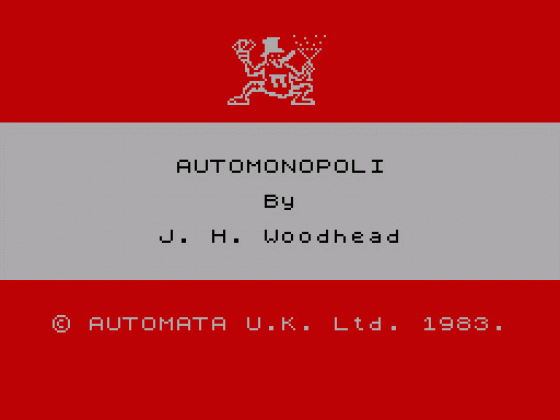
ZX Computing
 1st April 1984
1st April 1984
Categories: Review: Software
Author: Stuart Rogerson
Publisher: Automata
Machine: Spectrum 48K
Published in ZX Computing #12
Go To Jail
Go To Jail, for the 48K Spectrum, was originally marketed as Automonopoli but the name was changed, if their advertisements are to be believed, for reasons of copyright. It is written largely in Basic, with several machine code routines to scroll part of the screen one pixel at a time create fancy border patterns and store and retrieve the screen from above RAMTOP, so saving time building up the screen.
The program simulates the board game for between two and five players - one can be the computer if requested, thus one human can play against the computer. Whether the computer is an active player or not, it takes upon itself the role of banker, keeping account of all the player's money, property owned, and collection of fines and taxes, etc. The game is authentic in virtually all details to the original, even down to the captions on the chance cards!
At any time during the normal course of play, the screen displays two and a bit squares of a monopoly board in a large format, scrolling them from right to left as the player advances. While at times this may be confusing, the sites are large and the text easy to read - if the whole board was to be displayed, the information would be compressed to an unreadable degree. On the sites are shown the name, owner, rent and mortgage value. Also shown during a player's turn is the bank, giving details of the player's cash and mortgage value. If during the course of play a player becomes bankrupt, his property is repossessed by the bank and is up for auction, as happens when a player lands on property that is for sale and does not buy it. During these auctions, the computer will make its own bids, according to how highly it rates the value of the property.

The computer plays a fairly skillful game, especially when it has only one opponent. If the player has very little cash on hand, it will take advantage of offering the site up for auction then making a bid just higher than the player can afford, so buying half the board at ridiculous prices!
The game incorporates various facilities. Players can trade with each other bypassing the bank, houses and hotels can be bought at will and the game can be saved at any time - usually an essential feature! There are very few unfavourable points in the program. It is possible in a couple of places to cheat but the computer does not use these and all that is needed to overcome them is a little self-discipline on the part of the player. The only major complaint I can make against the program is its limited use of sound.
These drawbacks, however, are easily countered by the excellence of the program in other areas. Overall, it is extremely good value for £6 and I can recommend it to both seasoned addicts and newcomers to the game alike.




